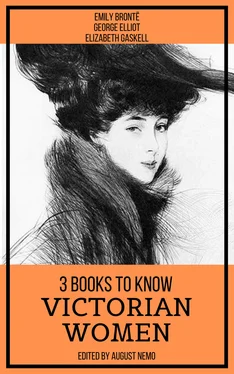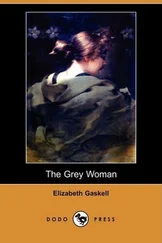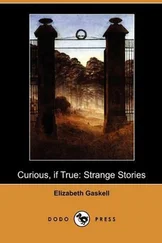There was such an anguish in the gush of grief that accompanied this raving, that my compassion made me overlook its folly, and I drew off, half angry to have listened at all, and vexed at having related my ridiculous nightmare, since it produced that agony; though why, was beyond my comprehension. I descended cautiously to the lower regions, and landed in the back kitchen, where a gleam of fire, raked compactly together enabled me to rekindle my candle. Nothing was stirring except a brindled, grey cat, which crept from the ashes and saluted me with a querulous mew.
Two benches, shaped in sections of a circle, nearly enclosed the hearth; on one of these I stretched myself, and Grimalkin mounted the other. We were both of us nodding, ere any one invaded our retreat, and then it was Joseph, shuffling down a wooden ladder that vanished in the roof, through a trap: the ascent to his garret, I suppose. He cast a sinister look at the little flame which I had enticed to play between the ribs, swept the cat from its elevation, and bestowing himself in the vacancy, commenced the operation of stuffing a three-inch pipe with tobacco. My presence in his sanctum was evidently esteemed a piece of impudence too shameful for remark: he silently applied the tube to his lips, folded his arms, and puffed away. I let him enjoy the luxury unannoyed; and after sucking out his last wreath, and heaving a profound sigh, he got up, and departed as solemnly as he came.
A more elastic footstep entered next; and now I opened my mouth for a “good morning,” but closed it again, the salutation unachieved; for Hareton Earnshaw was performing his orisons sotto voce, in a series of curses directed against every object he touched, while he rummaged a corner for a spade or shovel to dig through the drifts. He glanced over the back of the bench dilating his nostrils, and thought as little of exchanging civilities with me as with my companion the cat. I guessed, by his preparations, that egress was allowed, and, leaving my hard couch, made a movement to follow him. He noticed this, and thrust at an inner door with the end of his spade, intimating by an inarticulate sound that there was the place where I must go, if I changed my locality.
It opened into the house, where the females were already astir. Zillah urging flakes of flame up the chimney with a colossal bellows; and Mrs. Heathcliff, kneeling on the hearth reading a book by the aid of the blaze. She held her hand interposed between the furnace-heat and her eyes, and seemed absorbed in her occupation; desisting from it only to chide the servant for covering her with sparks, or to push away a dog, now and then, that snoozled its nose overforwardly into her face. I was surprised to see Heathcliff there also. He stood by the fire, his back towards me, just finishing a stormy scene to poor Zillah; who ever and anon interrupted her labour to pluck up the corner of her apron, and heave an indignant groan.
“And you, you worthless”— he broke out, as I entered, turning to his daughter-in-law, and employing an epithet as harmless as duck, or sheep, but generally represented by a dash-. “There you are, at your idle tricks again! The rest of them do earn their bread—you live on my charity! put your trash away, and find something to do. You shall pay me for the plague of having you eternally in my sight—do you hear, damnable jade?”
“I’ll put my trash away, because you can make me, if I refuse,” answered the young lady, closing her book, and throwing it on a chair. “But I’ll not do anything, though you should swear your tongue out, except what I please!”
Heathcliff lifted his hand, and the speaker sprang to a safer distance, obviously acquainted with its weight. Having no desire to be entertained by a cat-and-dog combat, I stepped forward briskly, as if eager to partake the warmth of the hearth, and innocent of any knowledge of the interrupted dispute. Each had enough decorum to suspend further hostilities: Heathcliff placed his fists, out of temptation, in his pockets; Mrs. Heathcliff curled her lip, and walked to a seat far off, where she kept her word by playing the part of a statue during the remainder of my stay. That was not long. I declined joining their breakfast, and, at the first gleam of dawn, took an opportunity of escaping into the free air, now clear, and still, and cold as impalpable ice.
My landlord hallooed for me to stop, ere I reached the bottom of the garden, and offered to accompany me across the moor. It was well he did, for the whole hillback was one billowy, white ocean; the swells and falls not indicating corresponding rises and depressions in the ground: many pits, at least, were filled to a level; and entire ranges of mounds, the refuse of the quarries, blotted from the chart which my yesterday’s walk left pictured in my mind. I had remarked on one side of the road, at intervals of six or seven yards, a line of upright stones, continued through the whole length of the barren: these were erected, and daubed with lime on purpose to serve as guides in the dark; and also when a fall, like the present, confounded the deep swamps on either hand with the firmer path: but, excepting a dirty dot pointing up here and there, all traces of their existence had vanished: and my companion found it necessary to warn me frequently to steer to the right or left, when I imagined I was following, correctly, the windings of the road. We exchanged little conversation, and he halted at the entrance of Thrushcross Park, saying, I could make no error there. Our adieux were limited to a hasty bow, and then I pushed forward, trusting to my own resources; for the porter’s lodge is untenanted as yet. The distance from the gate to the Grange is two miles: I believe I managed to make it four; what with losing myself among the trees, and sinking up to my neck in snow: a predicament which only those who have experienced it can appreciate. At any rate, whatever were my wanderings, the clock chimed twelve as I entered the house; and that gave exactly an hour for every mile of the usual way from Wuthering Heights.
My human fixture and her satellites rushed to welcome me; exclaiming, tumultuously, they had completely given me up; everybody conjectured that I perished last night; and they were wondering how they must set about the search for my remains. I bid them be quiet, now that they saw me returned, and, benumbed to my very heart, I dragged upstairs; whence, after putting on dry clothes, and pacing to and fro thirty or forty minutes, to restore the animal heat, I am adjourned to my study, feeble as a kitten: almost too much so to enjoy the cheerful fire and smoking coffee which the servant has prepared for my refreshment.
––––––––

WHAT VAIN weather-cocks we are! I, who had determined to hold myself independent of all social intercourse, and thanked my stars that, at length, I had lighted on a spot where it was next to impracticable—I, weak wretch, after maintaining till dusk a struggle with low spirits and solitude, was finally compelled to strike my colours; and, under pretence of gaining information concerning the necessities of my establishment, I desired Mrs. Dean, when she brought in supper, to sit down while I ate it; hoping sincerely she would prove a regular gossip, and either rouse me to animation or lull me to sleep by her talk.
“You have lived here a considerable time,” I commenced; “did you not say sixteen years?”
“Eighteen, sir: I came, when the mistress was married, to wait on her; after she died, the master retained me for his housekeeper.”
“Indeed.”
There ensued a pause. She was not a gossip, I feared; unless about her own affairs, and those could hardly interest me. However, having studied for an interval, with a fist on either knee, and a cloud of meditation over her ruddy countenance, she ejaculated: “Ah, times are greatly changed since then!”
Читать дальше













